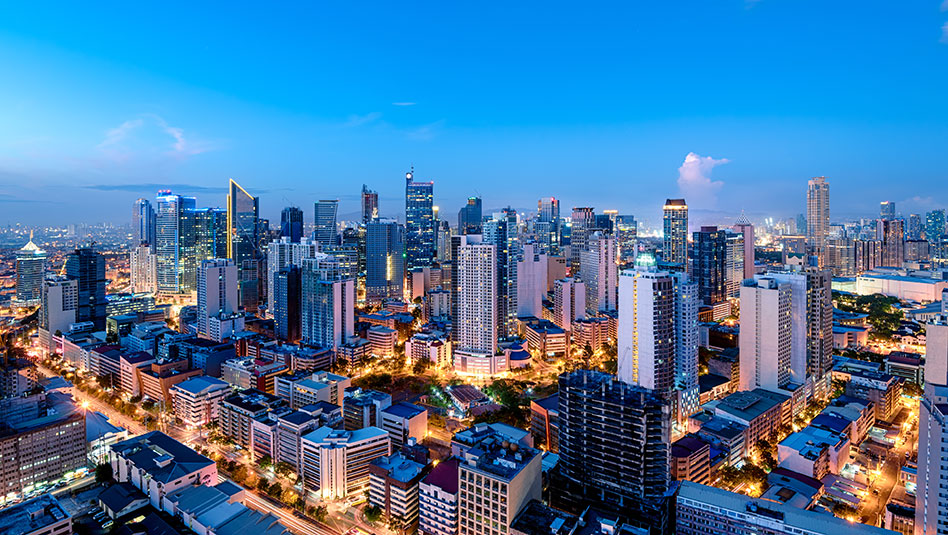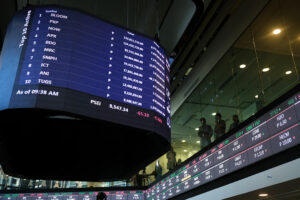




Quarterly Economic Growth Release: More BSP cuts to come
 DOWNLOAD
DOWNLOAD

Monthly Economic Update: Fed catches up
 DOWNLOAD
DOWNLOAD

Inflation Update: Steady and mellow
 DOWNLOAD
DOWNLOAD


Outlook for IPOs still murky for second half

Companies might be reluctant to go public in the second semester amid persistent inflation, high interest rates, peso weakness and lackluster trading volumes at the stock market, analysts said.
This puts in doubt whether the Philippine Stock Exchange (PSE) can achieve its target of having six initial public offerings (IPO) this year.
“It’s a generally challenging environment for IPOs. We are still not seeing the kind of robust investor sentiment that can support better valuations for issuers and drive stock prices higher,” China Bank Capital Corp. Managing Director Juan Paolo E. Colet said in a Viber message.
“Large IPOs will probably get pushed back until we see a dovish shift in monetary policy and sizeable foreign fund flows into our market,” he added.
This year, the PSE has had only two IPOs, with OceanaGold (Philippines), Inc. making its stock market debut on May 13, followed by Citicore Renewable Energy Corp. (CREC) on June 7.
“(The IPO target is) doable if the Federal Reserve and Monetary Board (MB) do the rate cuts by September,” BDO Capital & Investment Corp. President Eduardo V. Francisco told BusinessWorld in a Viber message.
Last week, the US Federal Reserve said it needs to see more evidence of easing inflation before lowering borrowing costs. The Fed also projected it would only cut rates by December.
Bangko Sentral ng Pilipinas (BSP) Governor Eli M. Remolona, Jr. has said the earliest the central bank could begin cutting rates is by August as inflation risks remain on the upside.
The BSP has kept the benchmark rate steady at a 17-year high of 6.5% since October 2023 to tame inflation.
April Lynn C. Lee-Tan, chief equity strategist at COL Financial Group, Inc. said the current environment is still not conducive for IPOs.
“Stocks are flat year to date and investor sentiment is weak as evidenced by lackluster volumes,” she said in a Viber message.
Investors are concerned that high inflation and elevated interest rates, as well as peso depreciation, will affect economic growth, she said.
Headline inflation quickened for the fourth straight month in May to 3.9% amid rising utility and transport costs alongside increasing food prices. This brought the five-month average inflation to 3.5%, within the BSP’s 2-4% full-year forecast.
In mid-May, the peso sank to the PHP 58-per-dollar level for the first time since November 2022.
The peso closed at PHP 58.65 a dollar on Friday, weakening by seven centavos from its PHP 58.58 finish on Thursday.
“There are still a lot of economic uncertainties and market dynamics [that] could affect investor sentiment and pricing strategies. That’s why companies planning to go public need to navigate these complexities carefully,” Regina Capital Development Corp. Head of Sales Luis A. Limlingan said in a Viber message.
TWO MORE?
Meanwhile, China Bank Capital’s Mr. Colet said the local bourse might see “at most” two companies conducting their IPOs in the second half.
“Some potential issuers that were initially looking to list this year have opted to wait for better market conditions. For example, prospective REIT (real estate investment trust) candidates are holding off their IPO plans while interest rates remain elevated,” he added.
The local bourse could have its third public listing this year with the planned PHP 580-million IPO of NexGen Energy Corp., which was recently approved by the Securities and Exchange Commission.
NexGen Energy is expected to list its shares on the PSE by July 16, based on the company’s preliminary prospectus dated May 31.
AP Securities, Inc. Research Head Alfred Benjamin R. Garcia said it is unlikely for the PSE to reach its IPO target this year.
“There’s simply not enough liquidity in the market to absorb an IPO of significant size at this time. It is possible if it is all small or if it is high-yielding preferred issues,” he said in a Viber message.
Sy-led SM Prime Holdings, Inc. has deferred its planned real estate investment trust (REIT) IPO, while Razon-led Prime Infrastructure Capital, Inc. postponed its first share sale as they wait for better market conditions.
“Recall that CREC had to reduce its offer to get the listing to push through, and SM’s REIT and Razon’s Prime Infra have definitively pushed back their IPOs to next year. The reality is, unless we can trade at least P7 billion per day, our market is too dry for an IPO,” Mr. Garcia said.
On the other hand, Mark V. Santarina, a trader at Globalinks Securities and Stocks, Inc., said that there is cautious optimism, especially for companies in sectors that are attracting investor interest, such as renewable energy.
“Despite the overall low trading volumes, the successful IPOs earlier in the year suggest that with the right market timing and sector focus, additional IPOs could be well-received,” he said in a Viber message.
He added that broader economic conditions and investor sentiment are crucial to the success of IPOs in the second half.
“The challenges for IPOs in the second half of 2024 include maintaining positive investor sentiment in a market with low trading volumes and potential volatility. Companies must demonstrate strong financial health and growth potential to attract investors,” Mr. Santarina said.
Rizal Commercial Banking Corp. Chief Economist Michael L. Ricafort said he is “cautiously optimistic” that the PSE could hit its target of six IPOs this year.
“If market conditions improve, triggered by Fed and local rate cuts later this year and in 2025, there could be more IPOs and other share sales since sellers of shares would like to sell at the highest price possible. That can only happen if market conditions improve further,” he said in a Viber message.
“At the very least, local stock markets could be partly supported by new record highs in most US stock markets recently,” he added.
On Friday, the benchmark PSE index dropped by 0.11% or 7.13 points to close at 6,383.70, while the broader all-share index gained 0.13% or 4.75 points to 3,447.75. — By Revin Mikhael D. Ochave and Sheldeen Joy Talavera, Reporters
This article originally appeared on bworldonline.com





 By BusinessWorld
By BusinessWorld